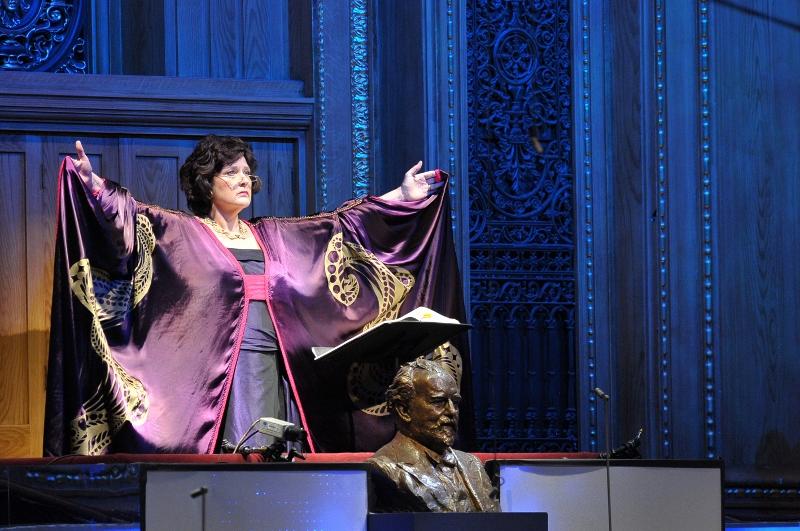Prom 45: The Midsummer Marriage, BBC Symphony Orchestra, Davis | reviews, news & interviews
Prom 45: The Midsummer Marriage, BBC Symphony Orchestra, Davis
Prom 45: The Midsummer Marriage, BBC Symphony Orchestra, Davis
Tippett's music in all its odd glory, with blazing music but a dog's dinner of a libretto

Jeremy Paxman’s beard may have been a wonder and a talking point for five days, but Michael Tippett’s opera The Midsummer Marriage beats it by almost 60 years. Ecstatic, visionary, energetic music, yes indeed. But, oh, the composer’s libretto! The Magic Flute, T. S.
It’s also a damned awkward piece to stage. Covent Garden’s original production in 1955 placed the story of the midsummer travails of the marriage-bound Mark and Jenifer in settings by sculptor Barbara Hepworth, described in the Times as like “Stonehenge reconditioned for the Festival of Britain”. The Proms, almost as courageously, attempted a semi-staging, but apart from the singers’ vivid costumes, ranging from sibylline clobber to lumberjack shirt, Kenneth Richardson’s stage direction chiefly underlined the absurdities of pushing characters through heaven, hell, and much vaguer places inside the Albert Hall’s Victorian pomp.
No attempt was made to simulate the hero and heroine’s clinching copulation session while enveloped in lotus petals
Formally attired, slow of gait on the auditorium steps, David Soar and Madeleine Shaw’s He-Ancient and She-Ancient looked for all the world like BAFTA presenters arriving onstage to present an award. Only Catherine Wyn-Jones, as soothsaying Madame Sosostris, really created a dramatic stir, first singing unseen from the gallery, then flinging arms wide by the distant organ. Luckily, no attempt was made to simulate the hero and heroine’s clinching copulation session while enveloped in lotus petals.
But the music, the music! That’s what keeps this opera intoxicating, right from the opening’s wonderful punchy chords and scurrying strings, which establishes an energy level that dips occasionally but always zooms back. For Sir Andrew Davis, Friday’s Prom slotted into a week mostly devoted to conducting Britten’s Billy Budd at Glyndebourne (itself due for a Prom semi-staging on August 27). Two different worlds, there; but Davis’s mastery and devoted love of Tippett’s ecstatic counterpoint, lyrical surges and kaleidscopic colours came through loud and clear. So did the BBC Symphony Orchestra, whether the sound was heraldic red (the gorgeous brass section), heavenly blue (radiant violins), eerie silver (the magic celesta) or a dappled, numinous tapestry binding all worlds into one.
And the singing? A few up and downs, not least in audibility and the difficult matter of balance in the Hall’s giant soup tureen. As Mark, the casually dressed bridegroom, tenor Paul Groves ideally needed rounder tones and a smoother flow to match Tippett’s florid flights of melody, almost neo-baroque. Erin Wall’s bride Jenifer (nondescript blue jacket) began muted and indistinct, but bumped up the volume and glow once she emerged supernaturally transfigured in the Act One finale.
Tippett’s libretto treats the love couple from the lower orders, secretary Bella and mechanic Jack, in a more user-friendly way. They have plainer words, bigger shafts of character. Ailish Tynan’s vocal gusto as Bella almost matched her bright secretary dresses, though feminists couldn’t be pleased by the character’s willingness to stay at home after marriage, cooking, washing clothes and bringing up baby. Meanwhile, Allan Clayton’s easy delivery entirely suited someone with hands slipped into the pockets of jeans and the hearty working man’s check shirt: another character locked into stereotypes one might have hoped the libertarian and former Trotskyist composer would have ditched.
A late arrival in the cast, David Wilson-Johnson was an asset too as the puffed-up businessman King Fisher, forceful in voice and gesture, though not when navigating Richardson’s toughest assignment – reaching Sosostris’s organ perch by pushing perilously right in front of the singing chorus. Not that the disruption, or anything else, stopped the flow from the BBC Singers and BBC Symphony Chorus, on top form throughout. As for Catherine Wyn-Rogers’ Sosostris, she looked, alas, better than she sounded: her great Act 3 aria, stately and luscious, needed more volume, more authority. Perhaps she should have been given a loudhailer.
Still, bumps and all, everyone got to the end, the opera’s follies clear enough, but with its energy and ecstatic zing even clearer. “A magnificent evocation of post-war renewal,” Oliver Soden wrote in his programme note. Exactly so, even with those sibylline misgivings.
rating
Explore topics
Share this article
Add comment
The future of Arts Journalism
You can stop theartsdesk.com closing!
We urgently need financing to survive. Our fundraising drive has thus far raised £49,000 but we need to reach £100,000 or we will be forced to close. Please contribute here: https://gofund.me/c3f6033d
And if you can forward this information to anyone who might assist, we’d be grateful.

Subscribe to theartsdesk.com
Thank you for continuing to read our work on theartsdesk.com. For unlimited access to every article in its entirety, including our archive of more than 15,000 pieces, we're asking for £5 per month or £40 per year. We feel it's a very good deal, and hope you do too.
To take a subscription now simply click here.
And if you're looking for that extra gift for a friend or family member, why not treat them to a theartsdesk.com gift subscription?

Comments
I think the time for worrying
Here. here......I have had to
The abstruse libretto is